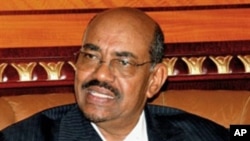While referenda on Sudan's possible breakup are fast approaching and fighting continues in the country's Darfur region, analysts say the pending indictment against Sudanese President Omar al-Bashir is having an impact.
A high-level regional meeting on Sudan's future due to take place in Kenya last month, was first moved to Ethiopia, and then postponed amid requests that Mr. Bashir be arrested if he attended.
Kenya's government had already come under widespread criticism after Mr. Bashir visited Nairobi in August and left without being arrested.
Kenya is a member state of the International Criminal Court. The Hague-based body has issued warrants for Mr. Bashir's arrest on charges of crimes against humanity, war crimes and genocide, over his role in the Darfur conflict.
Mr. Bashir has denied the charges, saying they are part of a western plot against him and Sudan. The charges were issued while he remains president and while negotiations take place to end the ongoing fighting involving government troops, militias and rebels in Darfur.
An independent researcher, Kevin Funk, says the indictment also complicates difficult negotiations ahead of two scheduled January votes on whether southern Sudan will break away from the north as part of an existing north, south peace process.
"It raises certain issues of legitimacy and I think perhaps even more importantly it pushes the Sudanese government back into a corner," said Funk. "There were all these fears before the ICC arrest warrants were released that Sudan would react violently to them and fortunately they did not. But there is no question that having done this, the ICC certainly put Sudan into a corner and kind of encouraged hardline elements within the regime, which is certainly not what we want to be doing at this point in time."
Another Sudan researcher, Eric Reeves from the U.S.-based Smith College, says the legitimacy of the International Criminal Court is also at stake.
"If we have a situation in which for political reasons we start withdrawing or suspending warrants, I think that is the end of the ICC, that is so transparently politicizing of a judicial system," said Reeves.
John Prendergast from the U.S.-based Enough Project to end genocide says the ICC does have an article in its charter which allows for the suspension of a case in the interests of peace.
"There are purists on one side who want [Mr.] Bashir to go to the Hague today," said Prendergast. "Who does not really in principal, except [Mr.] Bashir, even his underlings want him to go but they cannot do it, and on the other hand you have the peace advocates understandably who want peace tomorrow."
At a recent book signing, Prendergast outlined what he saw as a best case scenario.
"The hope is referendum occurs, peace in southern Sudan, diplomatic surge in Darfur, peace in Darfur, eventually [Mr.] Bashir ends up in the Hague in the dock," he said. "It is not impossible. We have seen that with Charles Taylor. It just requires a deep commitment on the part of the international community to both justice and peace, understanding that both of them going together at the same time often is not going to happen today or tomorrow."
In the case of Charles Taylor, the former Liberian president is currently on trial in the Hague, while the West African region he is accused of destabilizing in the 1990s has gone from conflict in several countries, including his own Liberia, to tightly contested, repeated, democratic elections.
Mr. Taylor has denied the accusations that he was behind a Liberian government-run network funding and arming rebels in West Africa in exchange for diamonds.
Bashir Indictment Hangs Over Sudan's Future




